人教版八年级英语上册 语法及知识点汇总
人教版八年级上册英语语法、短语和知识点总结归纳

人教版八年级上册英语语法、短语和知识点总结归纳一、语法1. 一般现在时- 用法:表示经常性或惯性的动作或状态。
- 结构:主语 + 动词原形 (+ 其他成分)- 示例:I play soccer every weekend.2. 一般过去时- 用法:表示过去某个时间点或一段时间内发生的动作或存在的状态。
- 结构:主语 + 动词过去式 (+ 其他成分)- 示例:She watched a movie last night.3. 现在进行时- 用法:表示现在正在发生的动作。
- 结构:主语 + am/is/are + 动词-ing (+ 其他成分)- 示例:They are studying for the exam.4. 现在完成时- 用法:表示动作或状态发生在过去某个时间点,但与现在有关。
- 结构:主语 + have/has + 动词过去分词 (+ 其他成分)- 示例:I have finished my homework.5. 情态动词- 用法:表示能力、意愿、可能性等。
- 常见的情态动词有 can, could, may, might, must, should, ought to 等。
- 示例:He should go to bed early.二、短语1. as well as- 用法:表示两个事物同时存在或发生。
- 示例:She can speak English as well as Chinese.2. in order to- 用法:为了做某事。
- 示例:They woke up early in order to catch the train.3. by the way- 用法:用于引入一个新的话题或问题。
- 示例:By the way, have you seen the latest movie?三、知识点1. 直接引语和间接引语- 直接引语:用引号括起来的原话。
- 间接引语:将直接引语转述为陈述句或疑问句。
人教版八年级英语上册知识点总结

人教版八年级英语上册知识点总结一、基本语法1.时态:英语时态分为以下几种:现在时、过去时、将来时。
每种时态又分为简单时态、进行时态、完成时态和完成进行时态等。
例如:–现在时:简单现在时: 主语 + 动词原形;进行现在时:主语 + be(am/is/are) + v-ing;完成现在时:主语 + have / has + 过去分词;完成进行现在时:主语 + have / has + been + v-ing。
–过去时:简单过去时:主语 + 动词过去式;进行过去时:主语 + was / were + v-ing;完成过去时:主语 + had + 过去分词;完成进行过去时:主语 + had + been + v-ing。
–将来时:简单将来时:主语 + will / shall + 动词原形;进行将来时:主语 + will / shall + be + v-ing;完成将来时:主语 + will / shall + have + 过去分词;完成进行将来时:主语 + will / shall + have + been + v-ing。
2.倒装句:倒装是指把谓语动词放在主语前面形成的一种语法现象。
如:Only in this way can we solve the problem. (只有这样才能解决问题。
) 倒装句句型格式为:_____+主语(名词或代词)+_____。
在不同的情况下需要用到不同的“辅助动词/助动词”来进行倒装。
3.被动语态:被动语态就是在句子中表达动作的承受者(即主语)的语态。
结构为:被(或受)动责任的动词(to be) + 过去分词。
如:The book was written by him.(这本书是由他写的。
)4.虚拟语气:虚拟语气是指在表示假设,愿望,建议等语气时所使用的一种语态形式。
其结构为:主语+should/could/might/would+(have)+动词原形。
如: If I were you, I would buy this dress(如果我是你,我会买这件衣服。
人教版八年级英语上册知识点总结和复习要点
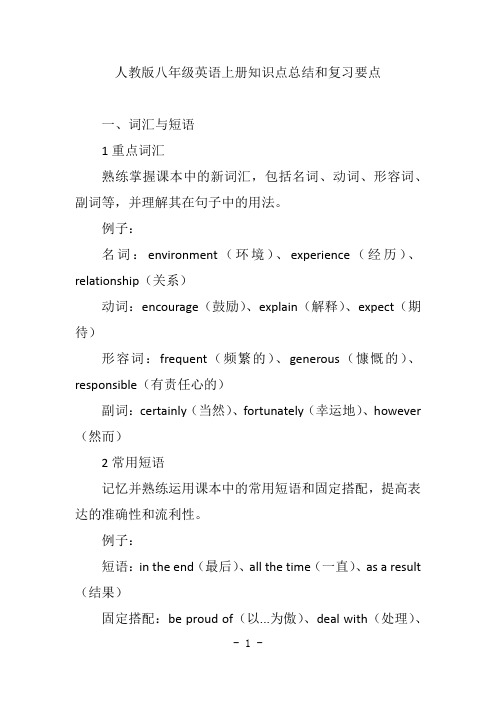
人教版八年级英语上册知识点总结和复习要点一、词汇与短语1重点词汇熟练掌握课本中的新词汇,包括名词、动词、形容词、副词等,并理解其在句子中的用法。
例子:名词:environment(环境)、experience(经历)、relationship(关系)动词:encourage(鼓励)、explain(解释)、expect(期待)形容词:frequent(频繁的)、generous(慷慨的)、responsible(有责任心的)副词:certainly(当然)、fortunately(幸运地)、however (然而)2常用短语记忆并熟练运用课本中的常用短语和固定搭配,提高表达的准确性和流利性。
例子:短语:in the end(最后)、all the time(一直)、as a result (结果)固定搭配:be proud of(以...为傲)、deal with(处理)、pay attention to(注意)二、句型与语法1基本句型熟练掌握五种基本句型,包括主语+谓语、主语+谓语+宾语、主语+谓语+间接宾语+直接宾语、主语+谓语+宾语+宾语补足语、主语+系动词+表语。
例子:主语+谓语:She sings.(她唱歌。
)主语+谓语+宾语:I like apples.(我喜欢苹果。
)主语+谓语+间接宾语+直接宾语:He gave me a book.(他给了我一本书。
)主语+谓语+宾语+宾语补足语:I found the book interesting.(我发现这本书很有趣。
)主语+系动词+表语:She is beautiful.(她很漂亮。
)2时态深入学习并掌握现在完成时、过去进行时、一般将来时、过去将来时等时态的用法和形式。
例子:现在完成时:I have already seen that movie.(我已经看过那部电影了。
)过去进行时:They were playing football when I called them.(我打电话给他们时,他们正在踢足球。
初二英语上册知识点总结(人教版)

初二英语上册知识点总结(人教版)1. 语法知识点- 一般现在时:表示经常性或惯性的动作、状态或客观真理。
- 一般过去时:表示过去发生的动作或存在的状态。
- 现在进行时:表示现在正在进行的动作。
- 一般将来时:表示将来将要发生的动作或存在的状态。
- 定语从句:用来修饰名词或代词的从句。
- 状语从句:用来表示时间、地点、原因、条件或目的等的从句。
- 直接引语和间接引语的转换:将直接引语转化成间接引语需要考虑时态、人称、时间、地点等问题。
2. 词汇与短语- 常用动词短语:例如,look forward to, take part in, give up等。
- 时间短语:例如,in the morning, at night, on weekends等。
- 形容词与副词:例如,beautiful, quickly, slowly等。
- 连词与介词:例如,but, and, in, on等。
3. 句型结构- 主语 + 谓语:例如,Tom studies English.- 主语 + 不及物动词 + 状语:例如,He runs quickly.- 主语 + 系动词 + 表语:例如,She is beautiful.- 主语 + 及物动词 + 宾语:例如,I eat an apple.4. 阅读技巧- 理解词义:通过上下文判断单词的意思。
- 掌握关键信息:抓住文章中的重要信息。
- 推测逻辑关系:通过逻辑推理理解段落和篇章的结构。
- 注意细节问题:注意文章中的细节信息。
5. 听力技巧- 提前预测:在听对话或短文之前,先预测可能会涉及的内容。
- 注意语境:在听时将听到的语句与前后语境联系起来理解。
- 注意听力焦点:抓住关键词汇、数字和特别强调的内容。
以上是初二英语上册知识点的简单总结,希望对你有帮助!。
八年级英语(人教版)上册重点语法知识点

八年级上册重点语法知识点1. 感叹句:感叹句是用来表达喜怒哀乐等强烈情感的句子。
感叹句一般用how或者what开头,句末加感叹号。
what修饰名词,how修饰形容词或副词。
具体句式如下:(1)what引导的感叹句:1)What a(an)+形容词+可数名词的单数形式+主语+谓语!What a clever boy he is!多么聪明的小男孩啊!2)What+形容词+可数名词的复数形式+主语+谓语!What interesting books the children are reading! 孩子们读的书多么有趣啊!3)What+形容词+不可数名词+主语+谓语!What cold weather it is!多冷的天!(2)how引导的感叹句:1)How+形容词或副词+主语+谓语!How lovely the baby is!这孩子真可爱!(lovely为形容词)How fast he runs! 他跑地多快啊!(fast为副词)2)How+形容词+a(an)+可数名词的单数形式+主语+谓语!How heavy a box they are carrying! 他们抬的箱子多重啊!3)How+主语+谓语!How time flies! 时间过得多快!( ) 1. interesting job this is!A.WhatB.HowC.What anD.How an( ) 2. Mo Yan won the Nobel Prize for Literature last year. _______excellent he is!A. HowB. WhatC. What aD. What an( ) 3. ---______day it is!--- Let’s go out and enjoy the sunshine!A. What a lovelyB. How windyC. What a rainyD. How lovely( ) 4. ______ terrible weather we had last Sunday!A. WhatB. What aC.HowD. How a( ) 5. ______useful the book is! We can know well about the city from it.A. WhatB. What aC. HowD. What an( ) 6. _____great picture! Who painted it?A. HowB. WhatC. How aD. What a( ) 7. ______ a beautiful car! I’ve never seen it before.A. WhatB. WhichC.HowD.Whether2. How oftenhow often意为“多久一次”,常用于对时间频率的提问。
人教版八年级英语上册语法总结

人教版八年级英语上册语法总结一、一般现在时。
1. 概念。
- 表示经常或习惯性的动作或状态;表示客观事实或普遍真理。
- 例如:I often get up at six o'clock.(经常的动作)- The earth goes around the sun.(客观真理)2. 动词形式。
- 当主语是第三人称单数(he/she/it等)时,动词要加 -s或 -es。
- 一般情况加 -s,如:like - likes;以s, x, ch, sh, o结尾的动词加 -es,如:go - goes, watch - watches;以辅音字母 + y结尾的动词,把y变为i再加 -es,如:study - studies。
- 当主语不是第三人称单数时,动词用原形。
例如:They play football every day.3. 句型结构。
- 肯定句:主语+动词(原形/第三人称单数形式)+其他。
- 否定句:主语+don't/doesn't+动词原形+其他。
(do not = don't,does not = doesn't)- 一般疑问句:Do/Does+主语+动词原形+其他?回答:Yes, 主语+do/does. No, 主语+don't/doesn't.二、一般过去时。
1. 概念。
- 表示过去某个时间发生的动作或存在的状态。
- 例如:I went to the park yesterday.2. 动词形式。
- 一般动词在词尾加 -ed,如:play - played;以不发音的e结尾的动词加 -d,如:live - lived;以重读闭音节结尾且末尾只有一个辅音字母的动词,双写这个辅音字母再加 -ed,如:stop - stopped;以“辅音字母 + y”结尾的动词,把y变为i再加 -ed,如:study - studied。
还有一些不规则动词,如:go - went, see - saw等。
最新人教版八年级上册英语知识点总结 成为英语小能手 快速提高听说读写能力

最新人教版八年级上册英语知识点总结成为英语小能手快速提高听说读写能力最新人教版八年级上册英语知识点总结英语是一门世界通用的语言,对于学习者而言,掌握好英语是非常重要的。
本文将为大家总结人教版八年级上册英语的知识点,帮助大家快速提高听说读写能力。
一、语法知识1. 一般现在时(Simple Present Tense):用于描述经常性的动作或客观事实。
例句:I often go to school by bus.2. 一般过去时(Simple Past Tense):用于描述过去发生的动作或状态。
例句:She watched a movie last night.3. 一般将来时(Simple Future Tense):用于表示将来要发生的动作或情况。
例句:I will visit my grandparents next week.4. 现在进行时(Present Continuous Tense):用于表示现在正在进行的动作。
例句:They are playing football in the park.5. 现在完成时(Present Perfect Tense):用于表示过去发生但与现在有关的动作。
例句:We have lived here for five years.6. 情态动词(Modal Verbs):用于表示能力、允许、必须、愿意等情态。
例句:You should finish your homework on time.7. 被动语态(Passive Voice):用于强调动作的承受者而不是执行者。
例句:The book was written by a famous author.二、词汇积累1. 常用动词(Verbs):如read、write、speak等。
2. 日常生活词汇(Daily Life Vocabulary):如food、clothes、weather等。
3. 时间词汇(Time Vocabulary):如Monday、morning、year 等。
(完整版)人教版八年级上册英语知识点汇总
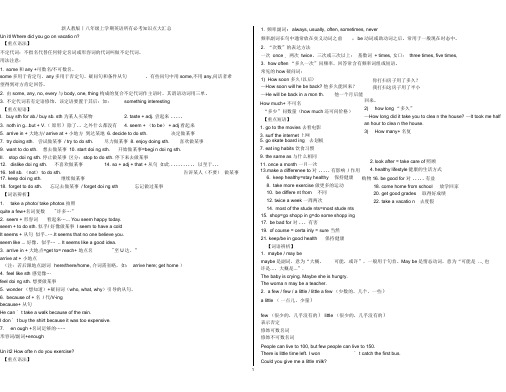
新人教版丨八年级上学期英语所有必考知识点大汇总Un itl Where did you go on vacatio n? 【重点语法】不定代词:不指名代替任何特定名词或形容词的代词叫做不定代词。
用法注意:1. some和any +可数名/不可数名。
some多用于肯定句,any多用于否定句、疑问句和条件从句。
有些问句中用some,不用any,问话者希望得到对方肯定回答。
2. 由some, any, no, every 与body, one, thing 构成的复合不定代词作主语时,其谓语动词用三单。
3. 不定代词若有定语修饰,该定语要置于其后:如:something interesting 【重点短语】I. buy sth for ab./ buy sb. sth 为某人买某物 2. taste + adj. 尝起来 .....3. noth in g...but + V.(原形)除了.. 之外什么都没有4. seem + (to be) + adj 看起来5. arrive in + 大地方/ arrive at + 小地方到达某地6. decide to do sth. 决定做某事7. try doing sth. 尝试做某事/ try to do sth. 尽力做某事8. enjoy doing sth. 喜欢做某事9. want to do sth. 想去做某事10. start doi ng sth. 开始做某事=begi n doi ng sth. II. stop doi ng sth. 停止做某事区分:stop to do sth. 停下来去做某事12. dislike doi ng sth. 不喜欢做某事14. so + adj + that + 从句如此.......... 以至于...16. tell sb. (not) to do sth. 告诉某人(不要)做某事17. keep doi ng sth. 继续做某事18. forget to do sth. 忘记去做某事/ forget doi ng sth 忘记做过某事【词语辨析】1. take a photo/ take photos 拍照quite a few+名词复数"许多…”2. seem + 形容词看起来…... You seem happy today. seem + to do sth. 似乎/ 好像做某事I seem to have a cold It seems + 从句似乎..….It seems that no one believe you. seem like ... 好像,似乎… .. It seems like a good idea.3. arrive in + 大地点=get to= reach+ 地点名"至U达. ”arrive at + 小地点(注:若后跟地点副词here/there/home, 介词需省略,如:arrive here; get home )4. feel like sth 感觉像…feel doi ng sth. 想要做某事5. wonder (想知道)+疑问词(who, what, why)引导的从句。
人教版八年级英语上册知识点汇总与练习
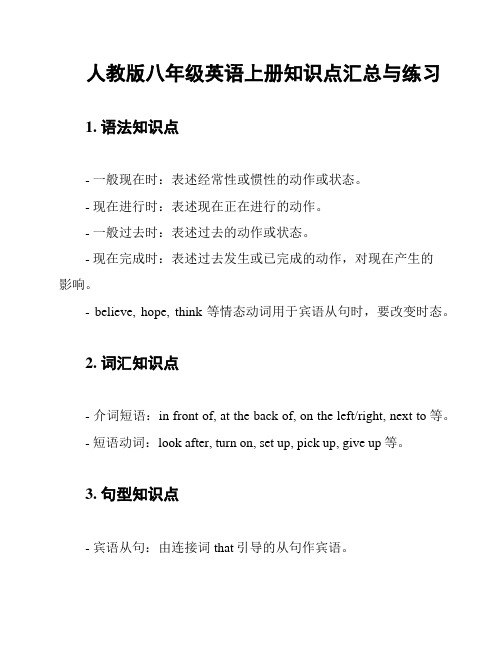
人教版八年级英语上册知识点汇总与练习1. 语法知识点- 一般现在时:表述经常性或惯性的动作或状态。
- 现在进行时:表述现在正在进行的动作。
- 一般过去时:表述过去的动作或状态。
- 现在完成时:表述过去发生或已完成的动作,对现在产生的影响。
- believe, hope, think等情态动词用于宾语从句时,要改变时态。
2. 词汇知识点- 介词短语:in front of, at the back of, on the left/right, next to等。
- 短语动词:look after, turn on, set up, pick up, give up等。
3. 句型知识点- 宾语从句:由连接词that引导的从句作宾语。
- 时间状语从句:由连接词when, before, after, while等引导的从句,用来表示时间关系。
- 目的状语从句:由连接词so that引导的从句,用来表示目的。
- 虚拟条件句:由连接词if引导的条件句,表示假设情况。
4. 阅读与写作练阅读材料:The Importance of ReadingHere are some tips to develop good reading habits:1. Set aside dedicated time for reading every day.2. Choose a variety of books based on your interests.3. Start with books that are at your reading level, and gradually challenge yourself.4. Take notes while reading to help with understanding and retention.5. Discuss the books you read with others to gain different perspectives.写作练:Write about your favorite book and explain why you like it.My favorite book is "Harry Potter and the Philosopher's Stone" by J.K. Rowling. I like this book because it takes me on a magical journey filled with adventure and excitement. The characters are well-developed and the story is captivating. I enjoy the creativity and imagination that Rowling brings to the world of Hogwarts. The book teaches important lessons about friendship, bravery, and the power of love. Overall, "Harry Potter and the Philosopher's Stone" is a book that brings joy and wonder to my life.5. 总结本文档汇总了人教版八年级英语上册的一些重要知识点,包括语法、词汇和句型。
新人教版八年级上册英语单元语法及知识点概述
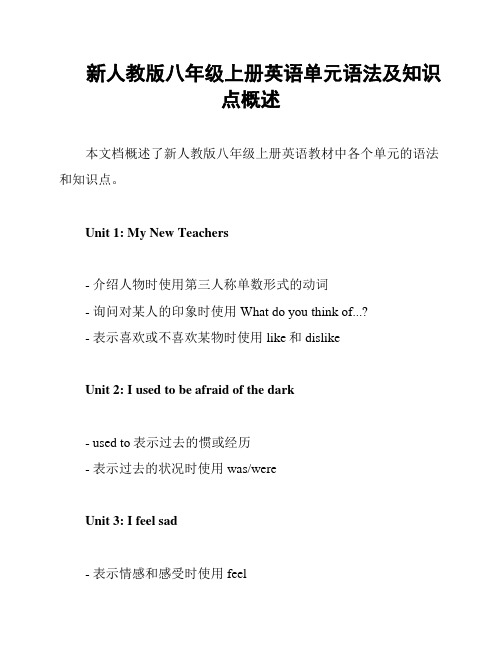
新人教版八年级上册英语单元语法及知识点概述本文档概述了新人教版八年级上册英语教材中各个单元的语法和知识点。
Unit 1: My New Teachers- 介绍人物时使用第三人称单数形式的动词- 询问对某人的印象时使用What do you think of...?- 表示喜欢或不喜欢某物时使用like和dislikeUnit 2: I used to be afraid of the dark- used to表示过去的惯或经历- 表示过去的状况时使用was/wereUnit 3: I feel sad- 表示情感和感受时使用feel- 使用be动词+形容词表达情感状态- 表示总是或经常做某事时使用always或often Unit 4: What's the best movie theater?- 比较级和最高级的用法- 询问建议时使用What do you suggest?- 表示原因时使用becauseUnit 5: It must belong to Carla- 表示推测或某事是肯定的时使用must- 表示推测或某事是可能的时使用might- 表示推测或某事是否定的时使用can'tUnit 6: I like music that I can dance to- 表示喜欢某种中性事物时使用like- 表示喜欢可以+动词原形的事物- 表示不喜欢不可以+动词原形的事物Unit 7: Teenagers should be allowed to choose their own clothes- 表示应该或不应该做某事时使用should or shouldn't- 表示能够或不允许做某事时使用can or can't- 使用be动词+动词不定式表示被允许或不被允许做某事Unit 8: Home alone- 表示需要或必需做某事时使用have to- 表示过去需要或必需做某事时使用had to- 表示建议或推荐时使用should或had betterUnit 9: When was it invented?- 使用一般过去时表示过去的经历或事件- 使用一般过去时的疑问句形式提问过去的经历或事件- 使用介词短语表示一段时间以上是新人教版八年级上册英语教材中各单元的语法和知识点概述。
(完整word版)人教版八年级英语上册重点语法及句型归纳

1、不定代词A.形容词修饰不定代词时,要后知,做后置定语。
I’ll tell you something interesting.B. 不定代词做主语时,谓语动词用第三人称单数。
Everyone is here.2、一般过去时:在一般过去式的句子中,要注意不规则动词过去式的形式与拼写,要牢记一般过去时的时间状语。
I went to the cinema yesterday. / He hurt his foot last night.3、频度副词:在使用频度副词时,要注意频度副词在句子中的位置是:置于be 动词/情态动词/助动词之后,置于实意动词之前,而且对频度副词疑问要用how often。
He always sits in the front of the classroom. / I am never late for school.------How often do you watch TV?-----Every night.4、形容词、副词的比较等级A.Than 是比较级的标志词,than前的形容词或副词要用比较级。
He is taller than me.B.有比较范围(如:in 或of 短语)时,用最高级。
He is the tallest of the three boys.C.形容词最高级前必须加定冠词the.I’m the best student in my class.D.不规则变化的形容词、副词的比较等级要记牢。
He plays the piano worst.5、动词不定式A. 跟动词不定式作宾语的常用动词要记牢。
如:agree (同意);offer (提出);intend,plan (打算,计划);demand,ask (要求);promise (答应);help (帮忙);prepare (准备);decide (决定);refuse (拒绝);dare (敢于);choose (选择);wish,hope,want,expect ,would like (希望,想要);fail ;(不能;忘记);pretend (假装);manage (设法);determine (决心)。
新人教版八年级上册英语语法,短语和知识点总结

新人教版八年级上册英语语法,短语和知识点总结一、语法1、时态(1)一般现在时:表示经常性或习惯性的动作或存在的状态,常和表示频度的时间状语连用,如:always, usually, often, sometimes, seldom, never等。
(2)一般过去时:表示过去发生的动作或存在的状态,常和表示过去的时间状语连用,如:yesterday, last week, an hour ago, in 2004等。
(3)现在完成时:表示从过去某一时间一直持续到现在的动作或状态,常和表示过去的时间状语连用,如:since, for, already, yet等。
(4)过去完成时:表示过去某一时间之前已经发生或完成的动作,常和表示过去的时间状语连用,如:before, by the time, when, after等。
2、情态动词(1)can:能够、会(2)could:能够、会(过去式)(3)must:必须(4)have to:不得不、必须(5)should:应该、将要(6)would:将要(过去式)3、虚拟语气(1)一般现在时:主语+should/were to +动词原形+其他(2)一般过去时:主语+should/were to have +过去分词+其他二、短语1、make a difference:有影响,有区别2、at once:立即,马上3、take care of:照顾,照料4、in the end:最后,终于5、be good at:擅长于6、as well as:也,又7、keep healthy:保持健康8、come true:实现,成真三、知识点一般现在时:表示经常性或习惯性的动作或存在的状态,常和表示频度的时间状语连用,如:always, usually, often, sometimes, seldom, never等。
人教版八年级(初中二年级)英语上册第一单元必背课文、单词、重点短语与语法梳理汇总

八年级英语上册第一单元必背课文、单词、重点短语与语法梳理汇总一、必背课文2d 对话Rick: Hi, Helen. Long time no see.Helen: Hi, Rick. Yes, I was on vacation last month.Rick: Oh! Where did you go on vacation?Helen: I went to Guizhou with my family.Rick: Wow! Did you see Huangguoshu Waterfall?Helen: Yes, I did. It was wonderful! We took quite a few photos there. What about you? Did you do anything special last month?Rick: Not really. I just stayed at home most of the time to read and relax.这篇对话是日常询问假期去处和活动的典型范例,包含了以下重点:-一般过去时的问答:“Where did you go on vacation?”“I went to...”“Did you...?”等句型,体现了一般过去时在询问过去动作和回答中的应用。
-描述假期经历的表达:“took quite a few photos”“stayed at home”“read and relax”等,这些短语可以用于描述自己或询问他人的假期行为。
二、必背单词1. anyone ['eniwʌn] pron. 任何人(用于疑问句或否定句中,相当于anybody)例句:Is there anyone in the classroom?(教室里有人吗?)2. anywhere ['eniweə(r)] adv. 在任何地方(用于否定句和疑问句)例句:I can't find my book anywhere.(我到处都找不到我的书。
人教版八年级上册英语知识点总结

人教版八年级上册英语知识点总结一、语法重点1. 时态- 一般现在时:表示经常发生的动作或状态,以及普遍真理。
- 一般过去时:描述过去发生的动作或状态。
- 现在进行时:表示正在进行的动作。
- 过去进行时:描述过去某一时刻正在进行的动作。
2. 代词- 人称代词主格:I, you, he, she, it, we, they。
- 物主代词:my, your, his, her, its, our, their。
- 反身代词:myself, yourself, himself, herself, itself, ourselves, yourselves, themselves。
3. 介词- 表示时间的介词:at, on, in。
- 表示地点的介词:at, on, in。
- 其他常用介词:with, by, for, from, to, of。
4. 句型结构- 一般疑问句:使用助动词do/does构成。
- 特殊疑问句:使用疑问词who, what, where, when, why, how 等。
- 否定句:使用助动词do/does后跟not。
5. 词汇- 动词短语:take off, turn on/off, get up, go to bed等。
- 形容词和副词:big/large, small, quick/fast, slowly, carefully等。
- 常用名词:student, teacher, school, family, friend等。
二、词汇与短语1. 学校相关词汇- classroom, teacher, student, library, gym, cafeteria。
- subject, lesson, homework, project, test, exam。
2. 家庭与朋友- family, parent, brother, sister, friend, neighbor。
初二英语知识点总结归纳上册人教版
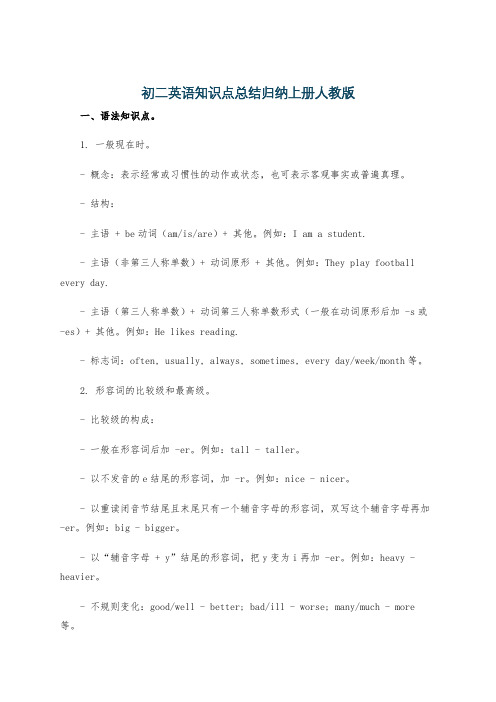
初二英语知识点总结归纳上册人教版一、语法知识点。
1. 一般现在时。
- 概念:表示经常或习惯性的动作或状态,也可表示客观事实或普遍真理。
- 结构:- 主语 + be动词(am/is/are)+ 其他。
例如:I am a student.- 主语(非第三人称单数)+ 动词原形 + 其他。
例如:They play football every day.- 主语(第三人称单数)+ 动词第三人称单数形式(一般在动词原形后加 -s或-es)+ 其他。
例如:He likes reading.- 标志词:often, usually, always, sometimes, every day/week/month等。
2. 形容词的比较级和最高级。
- 比较级的构成:- 一般在形容词后加 -er。
例如:tall - taller。
- 以不发音的e结尾的形容词,加 -r。
例如:nice - nicer。
- 以重读闭音节结尾且末尾只有一个辅音字母的形容词,双写这个辅音字母再加-er。
例如:big - bigger。
- 以“辅音字母 + y”结尾的形容词,把y变为i再加 -er。
例如:heavy - heavier。
- 不规则变化:good/well - better; bad/ill - worse; many/much - more 等。
- 比较级的用法:- 表示两者之间的比较,常用结构“比较级+than”。
例如:He is taller than me.- 最高级的构成:- 一般在形容词后加 -est。
例如:tall - tallest。
- 以不发音的e结尾的形容词,加 -st。
例如:nice - nicest。
- 以重读闭音节结尾且末尾只有一个辅音字母的形容词,双写这个辅音字母再加-est。
例如:big - biggest。
- 以“辅音字母 + y”结尾的形容词,把y变为i再加 -est。
例如:heavy - heaviest。
八年级上册英语人教版笔记
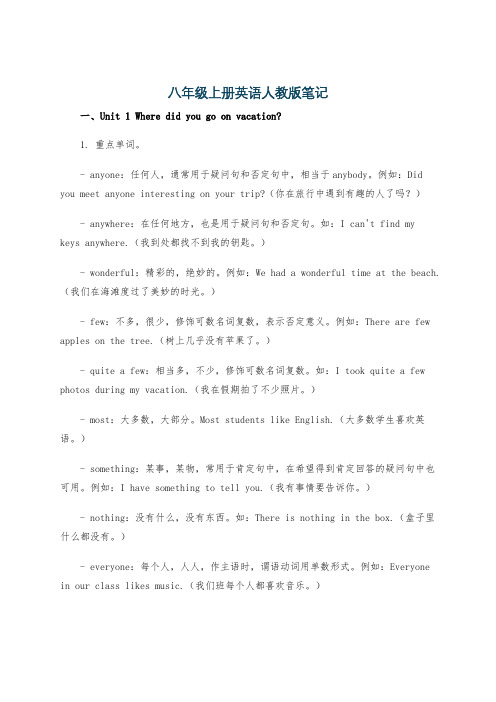
八年级上册英语人教版笔记一、Unit 1 Where did you go on vacation?1. 重点单词。
- anyone:任何人,通常用于疑问句和否定句中,相当于anybody。
例如:Did you meet anyone interesting on your trip?(你在旅行中遇到有趣的人了吗?)- anywhere:在任何地方,也是用于疑问句和否定句。
如:I can't find my keys anywhere.(我到处都找不到我的钥匙。
)- wonderful:精彩的,绝妙的。
例如:We had a wonderful time at the beach.(我们在海滩度过了美妙的时光。
)- few:不多,很少,修饰可数名词复数,表示否定意义。
例如:There are few apples on the tree.(树上几乎没有苹果了。
)- quite a few:相当多,不少,修饰可数名词复数。
如:I took quite a few photos during my vacation.(我在假期拍了不少照片。
)- most:大多数,大部分。
Most students like English.(大多数学生喜欢英语。
)- something:某事,某物,常用于肯定句中,在希望得到肯定回答的疑问句中也可用。
例如:I have something to tell you.(我有事情要告诉你。
)- nothing:没有什么,没有东西。
如:There is nothing in the box.(盒子里什么都没有。
)- everyone:每个人,人人,作主语时,谓语动词用单数形式。
例如:Everyone in our class likes music.(我们班每个人都喜欢音乐。
)- myself:我自己,是反身代词。
I can look after myself.(我能照顾自己。
人教版八年级上册英语重点短语与语法

人教版八年级上册英语重点短语与语法Unit 1 Where did you go on vacation?〔谈论假期生活,一般过去时〕Unit 2 How often do you exercise?〔谈论生活习惯,一般现在时〕Unit 3 I'm more outgoing than my sister〔谈论事物比照,形容词比较级〕Unit 4 What's the best movie theater?〔谈论事物比较,形容词最高级〕Unit5 Do you want to watch a game show?〔谈论内心想法,一般现在时〕Unit6 I’m going to study computer science.(谈谈生活的目标,一般将来时)Unit7 Will people have robots?(对将来生活的预言,一般将来时)Unit8 How do you make a banana milk shake?(描述进程,祈使句)Unit9 Can you come to my party?(学习邀请,作出、接受和拒绝邀请,学习表请求的句子)Unit10 If you go to the party, you’ll have a great time.(作出决定,学习if的条件状语从句)①复习一般过去时②复合不定代词的用法③反身代词的用法④系动词的用法⑤动词后的to do和doing 的区别⑥ed形容词和ing形容词的区别⑦“近义词〞的区别⑧本单元中的主谓一致现象⑨动词过去式的构成及不规则动词表⑩用同义短语转换同义句时谓语动词形式一致性的培养。
⑾感慨句的结构和连词的选择。
Unit1 Where did you go on vacation?重点短语1. go on vacation去度假2.stay at home 待在家里3.go to the mountains 去爬山4. go to the beach 去海滩5. visit museums 参观博物馆6. go to summer camp 去参加夏令营7.quite a few 相当多8.study for 为……而学习9.go out 出去10.most of the time 大局部时间11. taste good 尝起来很好吃12.have a good time 玩得愉快13. of course 当然14.feel like 给……的感觉;感受到15.go shopping 去购物16.in the past 在过去17. walk around 到处走走18. because of 因为19. one bowl of… 一碗……20. the next day 第二天21. drink tea 喝茶22. find out 找出;查明23. go on 继续24.take photos 照相25. something important 重要的事26. up and down 上上下下27. come up 出来28. buy sth. for sb. / buy sb. sth. 为某人买某物29. taste + adj. 尝起来……30. look+adj. 看起来……31.nothing…but+动词原形除了……之外什么都没有32.seem+〔to be〕+ adj. 看起来……33. arrive in+大地点/ arrive at+小地点到达某地34.decide to do sth. 决定去做某事35. try doing sth. 尝试做某事/36. try to do sth. 尽力去做某事37. forget doing sth. 忘记做过某事/38. forget to do sth. 忘记做某事39. enjoy doing sth. 喜欢做某事40. want to do sth. 想去做某事41. start doing sth. 开始做某事42. stop doing sth. 停止做某事43. dislike doing sth.不喜欢做某事44. keep doing sth. 继续做某事45. Why not do. sth.? 为什么不做……呢?46. so+adj.+that+从句如此……以至于……47. tell sb. (not) to do sth. 告诉某人〔不要〕做某事48 .have a good time=enjoy oneself=have fun(doing sth.)玩得痛快三、重点句子:1. Where did you go on vacation? 你去哪儿度假的?2. Long time no see. 好久不见。
人教版初中英语八年级上册英语知识点归纳总结复习(单词、短语、句子、语法、练习)
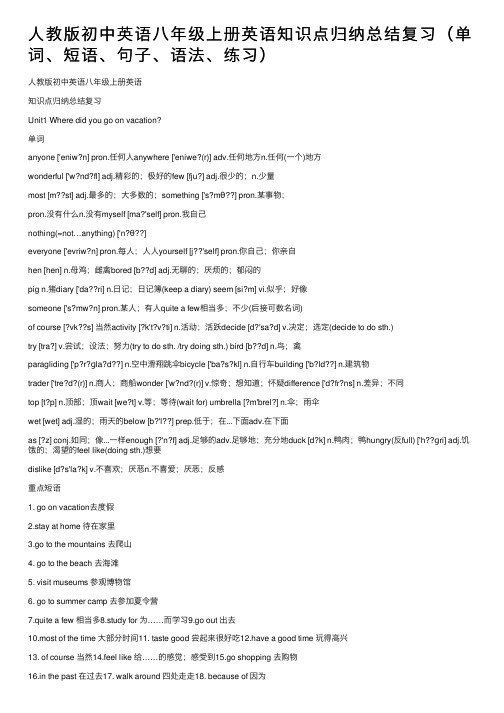
⼈教版初中英语⼋年级上册英语知识点归纳总结复习(单词、短语、句⼦、语法、练习)⼈教版初中英语⼋年级上册英语知识点归纳总结复习Unit1 Where did you go on vacation?单词anyone ['eniw?n] pron.任何⼈anywhere ['eniwe?(r)] adv.任何地⽅n.任何(⼀个)地⽅wonderful ['w?nd?fl] adj.精彩的;极好的few [fju?] adj.很少的;n.少量most [m??st] adj.最多的;⼤多数的;something ['s?mθ??] pron.某事物;pron.没有什么n.没有myself [ma?'self] pron.我⾃⼰nothing(=not…anything) ['n?θ??]everyone ['evriw?n] pron.每⼈;⼈⼈yourself [j??'self] pron.你⾃⼰;你亲⾃hen [hen] n.母鸡;雌禽bored [b??d] adj.⽆聊的;厌烦的;郁闷的pig n.猪diary ['da??ri] n.⽇记;⽇记簿(keep a diary) seem [si?m] vi.似乎;好像someone ['s?mw?n] pron.某⼈;有⼈quite a few相当多;不少(后接可数名词)of course [?vk??s] 当然activity [?k't?v?ti] n.活动;活跃decide [d?'sa?d] v.决定;选定(decide to do sth.)try [tra?] v.尝试;设法;努⼒(try to do sth. /try doing sth.) bird [b??d] n.鸟;禽paragliding ['p?r?ɡla?d??] n.空中滑翔跳伞bicycle ['ba?s?kl] n.⾃⾏车building ['b?ld??] n.建筑物trader ['tre?d?(r)] n.商⼈;商船wonder ['w?nd?(r)] v.惊奇;想知道;怀疑difference ['d?fr?ns] n.差异;不同top [t?p] n.顶部;顶wait [we?t] v.等;等待(wait for) umbrella [?m'brel?] n.伞;⾬伞wet [wet] adj.湿的;⾬天的below [b?'l??] prep.低于;在...下⾯adv.在下⾯as [?z] conj.如同;像...⼀样enough [?'n?f] adj.⾜够的adv.⾜够地;充分地duck [d?k] n.鸭⾁;鸭hungry(反full) ['h??ɡri] adj.饥饿的;渴望的feel like(doing sth.)想要dislike [d?s'la?k] v.不喜欢;厌恶n.不喜爱;厌恶;反感重点短语1. go on vacation去度假2.stay at home 待在家⾥3.go to the mountains 去爬⼭4. go to the beach 去海滩5. visit museums 参观博物馆6. go to summer camp 去参加夏令营7.quite a few 相当多8.study for 为……⽽学习9.go out 出去10.most of the time ⼤部分时间11. taste good 尝起来很好吃12.have a good time 玩得⾼兴13. of course 当然14.feel like 给……的感觉;感受到15.go shopping 去购物16.in the past 在过去17. walk around 四处⾛⾛18. because of 因为⼀碗…… 20. the next day 第⼆天21. drink tea 喝茶19. one bowl of… 22. find out 找出;查明23. go on 继续24.take photos 照相25. something important 重要的事26. up and down 上上下下27. come up 出来28. buy sth. for sb. / buy sb. sth. 为某⼈买某物29. taste + adj. 尝起来…… 动词原形除了……之外什么都没有30. look+adj. 看起来…… 31.nothing…but+32.seem+(to be)+ adj. 看起来…… 33. arrive in+⼤地点/ arrive at+⼩地点到达某地34.decide to do sth. 决定去做某事35. try doing sth. 尝试做某事/ 36. try to do sth. 尽⼒去做某事37. forget doing sth. 忘记做过某事/ 38. forget to do sth. 忘记做某事39. enjoy doing sth. 喜欢做某事40. want to do sth. 想去做某事41. start doing sth. 开始做某事42. stop doing sth. 停⽌做某事43. dislike doing sth.不喜欢做某事44. keep doing sth. 继续做某事45. Why not do. sth.? 为什么不做……呢?46. so+adj.+that+从句如此……以⾄于…… 47. tell sb. (not) to do sth. 告诉某⼈(不要)做某事48 .have a good time=enjoy oneself=have fun(doing sth.)玩得痛快三、重点句⼦:1. Where did you go on vacation? 你去哪⼉度假的?2. Long time no see. 好久不见。
- 1、下载文档前请自行甄别文档内容的完整性,平台不提供额外的编辑、内容补充、找答案等附加服务。
- 2、"仅部分预览"的文档,不可在线预览部分如存在完整性等问题,可反馈申请退款(可完整预览的文档不适用该条件!)。
- 3、如文档侵犯您的权益,请联系客服反馈,我们会尽快为您处理(人工客服工作时间:9:00-18:30)。
Unit 1一、必背单词短语。
【教材知识点总结】Section A1.Where did you go on vacation? (P. 1)on vacation意为“在度假”,结构“on+名词”表示“在某种状态中”。
例句:My family went to Hainan on vacation last year.2....visited my uncle (P. 1)visit此处用作及物动词,后接人或物做宾语,意为“拜访、看望”,后接表示地点的名词,意为“参观、游览”。
例句:I visited my grandmother last week.例句:Do you want to visit Shanghai?3....go with anyone? (P. 2)(1)anyone用作不定代词,意为“有人、任何人”,相当于anybody,用于疑问句和否定句中,在肯定句中用someone或者somebody。
但是anyone也可以用在肯定句中,表示“任何一个人”。
例句:Did you meet anyone friendly in that city?例句:Anyone can be helpful in some way.(2)anyone只能指人,不可以指物,后面不接of短语;any one既可以指人也可以指物,后可接of短语。
例句:You can ask any one of us about this question.4....buy anything special? (P. 2)(1)buy用作双宾语动词,表示“买”,常用的结构为“buy sb. sth.”或者“buy sth. for sb.”,表示“为某人买某物”。
例句:My father bought me a bike.=My father bought a bike for me.【拓展】可接双宾语的动词还有give, bring, show, tell, sell等。
give sb. sth.=give sth. to sb. 给某人某物bring sb. sth.=bring sth. to sb. 把某物带给某人show sb. sth.=show sth. to sb. 给某人看某物tell sb. sth.=tell sth. to sb. 告诉某人某物sell sb. sth.=sell sth. to sb. 把某物卖给某人(2)形容词修饰复合不定代词(something/body/one, anything/body/one, nothing/body/one, everything/body/one)时,放在复合不定代词后面。
例句:I have __________ _____________ (一些重要的事情) to tell you.5.We took quite a few photos there. (P. 2)take photos意为“拍照、照相”,take a photo/photos of sb./sth.意为“给……拍照”。
例句:We _________(take) many photos on the Great Wall last year.例句:Could you _______( take) a photo of us?6.I just stayed at home most of the time to read and relax. (P. 2)most of表示“……中大多数”,后接可数名词或者不可数名词,作主语时,谓语动词单复数取决于后面所接名词的单复数。
例句:Most of the food _________(go) bad.例句:Most of us ________(be) going to the park.7.No, I bought nothing. (P. 3)nothing用作不定代词,表示“没有任何东西”,相当于not anything。
例句:I did nothing special last month.=I didn’t do ____________ special last month.8.Did everyone have a good time? (P. 3)have a good time表示“玩得开心”,后接动词ing,表示“做某事很开心”,have a good time相当于enjoy oneself/have fun。
例句:We had a good time at the party. =We enjoyed ourselves at the party.=We had fun at the party.9.How did you like it? (P. 3)How do you like...?意为“你认为……怎么样”,相当于How do you feel about...?或者What do you think of...?例句:-How do you _________ the film? -Wonderful.-A. think of B. like10.Did you go shopping? (P. 3)go shopping表示“去购物、去买东西”,相当于do some shopping。
类似的短语还有:go swimming, go skating, go fishing, go hiking, go boating, go camping等。
I went shopping and bought something for my parents.11.Of course! (P. 3)of course意为“当然”,相当于sure或者certainly。
例句:-May I borrow your dictionary?例句:-Of course!12.Still no one seemed to be bored. (P. 3)(1) seem用作系动词,表示“似乎、好像”,常用的结构有:seem+adj./to be/that+句子。
例句:The story __________(seem) true.例句:What he said seemed __________(be) a lie.例句:It ________(seem) that they are going to pull down the house.(2)bored表示“感到厌倦的”,用来说明人的感受;boring表示“令人厌烦的、单调的”,用来说明事物的特征。
例句:The film was so boring that almost anyone felt bored.【拓展】以ed结尾的形容词,通常用来修饰或者描述人,以ing结尾的动词,通常用来修饰或者描述物,类似的形容词还有:interesting/interested; exciting/excited; surprising/surprised。
Section B1.What activities do you find enjoyable? (P. 5)(1)find这里表示“发现、觉得”,宾语后常接宾语补足语,常用的结构有:find sb./sth+n./adj./doing sth./介词短语。
例句:The students find _________(she) a kind teacher.例句:I find the book _________(use).例句:When I passed his house, I found his wife __________(cook).例句:Finally, they found the boy in the tree.(2)enjoyable是enjoy的形容词形式,表示“有趣的、令人愉快的”。
例句:I’m sure that we will have an enjoyable vacation.例句:The job is enjoyable and I like it.2.I arrived in Penang in Malaysia this morning with my family. (P. 5) arrive作不及物动词,表示“到达”,接宾语时,需要加上介词in或者at。
例句:When did you arrive?例句:We are arriving at the station at two o’clock.【拓展】reach表示“到达”时,是及物动词,后面直接接表示地点的名词作宾语。
另外两个表示“到达”的动词(get和arrive)都是不及物动词,get to+地点;arrive in/at+地点。
3....so we decided to go to the beach near our hotel. (P. 5)例句:decide表示“决定”时,常用的结构为:decide to do sth.“决定做某事”。
例句:The government decided to build another school in this village.4.My sister and I tried paragliding. (P. 5)try doing sth. “尝试做某事”;try to do sth. “尽力做某事”。
例句:The doctor tries to save the sick girl.例句:The boy tried playing the piano.【拓展】try也可以用作名词,表示“尝试”,have a try表示“尝试一下”。
I’m going to have a try.5.I felt like I was a bird. (P. 5)feel like此处表示“感觉像”,后接从句。
He feels like he is swimming.【拓展】feel like还可以表示“想要”,后接名词、代词或者动名词做宾语,feel like doing sth.=would like to do sth.=want to do sth.Do you feel like __________(go) out for a walk with me?=Would you like _________(go) out for a walk with me?=Do you want __________(go) out for a walk with me?6.There are a lot of new buildings now...(P. 5)a lot of相当于lots of表示“许多”,可以用来修饰可数名词复数或者不可数名词。
